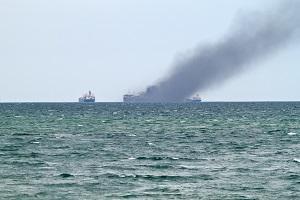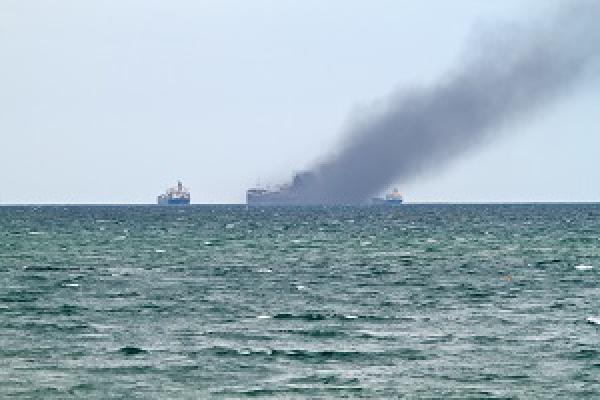
Steamship Mutual
Published: June 15, 2018

In Glencore Energy UK Ltd and Another v Freeport Holdings Ltd (The “Lady M”) [2017] EWHC 3348 (Comm) the High Court has decided that a shipowner can rely on the fire defence in the Hague-Visby rules even in a case where the fire was started deliberately by a ship’s officer.
Background
While on a voyage from the Black Sea to the U.S. Gulf with a cargo of fuel oil, the “Lady M” suffered an engine room fire, and her Owners entered into a Lloyds Open Form salvage contract to have the ship towed to Las Palmas for repairs. It was discovered that the fire had been started deliberately by the chief engineer, who was said to be suffering from stress. Owners declared general average.
The cargo owners, Glencore, incurred a liability towards the salvors, and they commenced proceedings against Owners for an indemnity. This was on the grounds of an alleged breach of the contracts of carriage evidenced by the bills of lading, alternatively in bailment. Owners counter-claimed for General Average contributions.
The Court considered two preliminary issues, based on facts that were agreed between the parties:
- whether the conduct of the chief engineer constituted barratry, and;
- whether Owners could rely on Hague-Visby Rules Article IV Rule 2(b) (the fire defence) when the fire was started deliberately, or Rule 2 (q) (any other cause arising without the actual fault or privity of the owner or the without the fault or neglect of the agents or servants of the carrier) in defence to cargo’s claim.
Decision
First Issue – did the conduct of the chief engineer constitute barratry?
The Court considered the Marine Insurance Act 1906 definition of barratry as “every wrongful act wilfully committed by the master or crew to the prejudice of the owner, or, as the case may be, the charterer” and set out the test for barratry as (i) a deliberate act/omission by the servants of the owners (ii) which is wrongful (iii) to the prejudice of the interests of shipowners/ship/goods (whether or not intended) (iv) without the privity of the shipowner.
The Court defined ‘wrongful” as (a) generally recognised as a crime, including the necessary mental element; or (b) a serious breach of duty owed to the shipowner, committed by the person knowingly or recklessly.
The Court deferred determination of the first issue due to lack of evidence on the seafarer’s state of mind.
Second Issue – did the Hague Visby defences apply to protect the shipowner?
The Court reviewed the history and purpose of the Hague-Visby Rules which had been developed at an international convention, and considered that the words agreed at that convention should be given their plain ordinary meaning. No exclusions of the fire defence were agreed at the convention, so the High Court held that the fire defence applied to fire without any qualification as to how the fire started, whether intentionally or accidentally, or who might have started it. Therefore the peril of fire under Rule 2(b) was capable of exempting an owner even if a fire is caused deliberately.
Article IV 2. (q) exempts the shipowner from liability for loss or damage resulting from “Any other cause arising without the actual fault of privity of the carrier, or without the fault or neglect of the agents or servants of the carrier, but the burden of proof shall be on the person claiming the benefit of this exception to show that neither the actual fault or privity of the carrier nor the fault or neglect of the agents or servants of the carrier contributed to the loss or damage”.
To determine whether or not the act of the chief engineer was an act of “a servant” it was considered whether or not he was acting within the scope of his duties. The Court found that, if considered under the English law principles of vicarious liability, i.e. The Chyebassa [1966] 2 Lloyd’s Rep 1993, or if the Court was to apply its own test of whether the conduct in question occurred in the course of the servant/agent performing a function in dealing with the ship/cargo which he was performing on behalf of the shipowners (see The Global Santosh), the outcome was the same. The crews’ overriding purpose was to look after the ship and cargo until it arrived at its destination. In fulfilling that purpose the chief engineer was responsible for the management of the main engines. He had responsibility for, and access to, the engine control room at any time, whether or not he was on duty. The Court concluded that in setting fire to the control room, with intent to cause damage, the chief engineer was misusing his position in the direct field of activity he was employed, and so took place as an act of a servant of the shipowner, within the scope of his duties. In these circumstances, the Article IV. 2 (q) defence would not exempt the shipowner in these circumstances.
Comment
The Court’s approach to the construction of the Hague-Visby Rules, which form part of an international convention, was to ascertain the ordinary meaning of the words and to construe them using broad principles of interpretation, and not apply any special meaning or interpretation particular to English case law. In this case, the Court was satisfied that the fire defence in the Hague-Visby rules was not subject to any exception in the case of a fire that was caused deliberately.
Article by Chloe Townley


